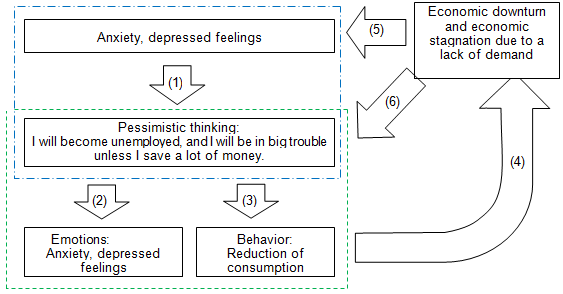Economic recovery is one of the most important issues facing Japan, and there is a call for coming up with effective measures to put the Japanese economy on a growth track. With the aim of contributing to tackling this important issue, a psychological model of a recession and a psychological prescription for getting out of a recession are shown below.
Psychological model of a recession
The following chart shows a psychological model of a recession. The keywords of this model are "emotions" and "thoughts". The area enclosed in the blue line in the upper left of this chart shows that anxiety, depressed feelings, and other similar emotions trigger pessimistic thought patterns, based on psychological research on the relationship between emotions and decision making. For example, numerous research results have shown that natural worriers, people who feel a sense of anxiety, and people who are depressed tend to estimate higher risks of negative events and think pessimistically (arrow 1) compared with ordinary people (Note 1). In this chart, it is shown that anxiety or depressed feelings trigger thoughts such as, "I will become unemployed, and I will be in big trouble unless I save a lot of money."

The area enclosed in the green line in the lower left of this chart shows a cognitive model, which is a basic framework of cognitive behavioral therapy (CBT), a leading psychotherapy. According to the cognitive model, people frequently hold thoughts with "cognitive distortion," and as people believe such thoughts, they develop negative emotions and inappropriate behavior (Note 2). In the chart, it is shown that people who believe the pessimistic thought, "I will become unemployed, and I will be in big trouble unless I save a lot of money," come to have a sense of anxiety, etc. (arrow 2) and display risk averse behavior to reduce consumption (arrow 3). In contrast to the area enclosed in the blue line in the upper left, the area enclosed in the green line shows an aspect in which thoughts trigger emotions.
When people reduce consumption because of anxiety or depression, a lack of demand results. When there is a lack of demand despite the existence of sufficient supply capacity, the economy enters into a recession (arrow 4) (Note 3). Once in a recession, in response, people develop a sense of anxiety, depressed feelings, or pessimistic thoughts (arrows 5 and 6). Due to this vicious circle, the recession is prolonged.
Psychological prescription for getting out of a recession
What type of psychological prescription is needed to get out of a recession? Based on the above chart, it seems possible to reduce the level of pessimistic thoughts by alleviating anxiety and depressed feelings through certain means (to stop the flow resulting from arrow 1). It also seems possible that reducing the level of pessimistic thoughts prevents a decline in motivation for consumption that is triggered by the negative thoughts (to stop the flow resulting from arrow 3).
Even though there is room for improvement, progress in clinical psychology and psychiatry has made it possible to ease anxiety or depression and reduce the level of pessimistic thoughts without depending on medication. For example, CBT aims to reduce negative emotions or make behavior appropriate by modifying the thoughts behind negative emotions into rational thinking. If the degree of belief in the pessimistic thought that "I will become unemployed" is reduced by using the techniques of CBT, it may be possible to alleviate anxiety or depression and prevent a decline in motivation for consumption (Note 4).
CBT can be taught to groups through corporate training and school education or to individuals via the Internet. Even people who are not suffering from mental health issues can use it as a health management method to prevent such issues. This shows that efforts to prevent mental health issues may produce a secondary effect of helping the nation climb out of a recession. In addition to CBT, research on various methods to reduce the degree of belief in pessimistic thoughts and to ease negative emotions is underway. For example, the "writing cure" is a remedy that can be easily used by individuals on their own as long as they have a pen and a piece of paper (Note 5). The cognitive-bias modification (CBM) approach enables people to reduce anxiety or depressed feelings by using computers (Note 6).
Importance of joint research by economists and psychologists
It is not fully known how much of the psychological model of a recession is correct. But recent research has proven to a certain degree that shocking events such as the bankruptcy of Lehman Brothers in 2008 deteriorate the economy through the worsening of people's anxiety and increased risk evaluation (Note 7). On the other hand, as for chronic recessions such as the prolonged downturn of the Japanese economy, people may rationally determine to choose saving over consumption without being driven by emotions. In order to come closer to the truth regarding these yet-to-be-clarified issues, it is important for economists and psychologists to cooperate to conduct scientific verification through experiment and data analysis.
The Research Institute of Economy, Trade and Industry (RIETI) launched a project titled "Research on Mental Health from the Perspective of Human Capital" in July 2012. In this project, we are planning to work on themes that are likely to connect economics and psychology. I hope that many economists and psychologists will be interested in this project and participate.


